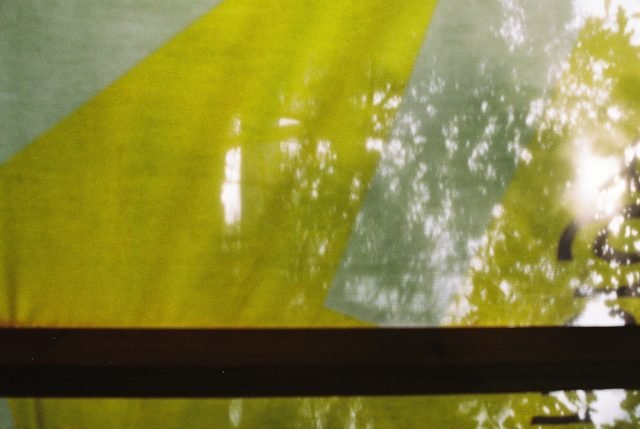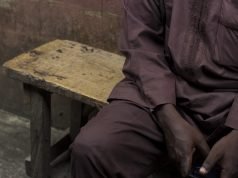By Suzanne Ushie—
Two months to the day Uzilibe’s boss groped her, she emptied her drawers and cleared her desk. As her colleagues trooped into her cubicle to say goodbye, she wondered which version of the story they’d heard. The boss himself, a creative director with a fondness for red sneakers, a thin man who sucked in his stomach to disguise its softness, had said little to her since that day. Perhaps, like Uzilibe, he was tired. With friends, she had shared some details of the story too many times, not once letting out more. Her friends called her boss useless. But she could tell, from their stilted smiles, that they thought her crazy for resigning when she didn’t have a new job. Of all her friends, only Bendeutsu didn’t think her senses had fled. Only Bendeutsu knew what it meant to want something else even if you didn’t know exactly what it was. What she did say, though, was that Uzilibe needed a break with her in London.
Now they were in Bendeutsu’s living room, Bendeutsu lying flat on a yoga mat, doing what she had called her Zen Locus on their way from the airport. Three short breaths. Two deep breaths. A minute or more of silence. Uzilibe sat on the sofa and watched her.
“Are you going to do this all day?” Uzilibe asked at last.
“Count from one to twenty,” Bendeutsu said. “I’ll be done before you know it.”
“I’ve forgotten how to count,” Uzilibe said.
“That’s what happens when you spend too much time writing advertising copy.”
Uzilibe thought of the smoothest way to move the conversation to Bendeutsu’s own career. Barely a couple of years ago, Bendeutsu had left a job in banking, dusted her red passport, and moved back to London to write.
“So am I allowed to ask how your book is going or are you still afraid that you’ll jinx it if you talk about it?”
“I’m afraid of the bloody book, full stop. It’s actually a novel-in-stories and all of a sudden, nobody wants to publish a novel-in-stories. I’ve been trying to get an agent for ages.” Bendeutsu got up and walked towards the sofa. She was small and slender, with sloping eyes and high cheekbones, a face that eclipsed the body. “There’s pasta in the fridge,” she said as she sat down next to Uzilibe. “Would you like some?”
“Not now. Maybe later. I ate on the plane.”
“Okay. What do you think of all this anyway?” Bendeutsu asked with a flick of her hand at the furnishing: a black armchair, an ivory rug, a beige lamp, everything small and stark, each unshowy piece a show in itself. “My flatmate Johann put it together. He’s quite the minimalist. I suspect he flosses his teeth with the same string every night.”
“Oh, come on.”
“I’m serious. It’s just that I feel bad whenever I complain about him; he’s such a sweetheart. Would you believe he called from Germany this morning to ask how I’m doing?”
“He likes you.”
“Yeah right.”
“By the way, how is Tosan?” Uzilibe asked.
Bendeutsu went stiff. There was, in that swift motion, a slight rebuke. “Didn’t I tell you that I broke up with him?”
Uzilibe wasn’t sure. But she did recall a time when Bendeutsu developed an agitation over the oddest of things. A dog video on YouTube would bring on a spell of tears. A Guardian article on a bomb blast in Nigeria would lead to frantic phone calls to friends and family. A rejection letter from yet another publisher would inspire a long email about the impermanence of every condition.
“Oh. I must have forgotten,” Uzilibe said. She didn’t know Tosan well enough to feel bad about their breakup. She had only seen a few of his photographs on Bendeutsu’s Instagram. In one, he was squinting, his lean face close shaven, an arm around a bronzed statue of David Beckham in Madame Tussard’s. In another, clearly self-taken, he’d given the camera a rather unsettling, red-eyed stare.
“Please. I’m not missing anything,” Bendeutsu said. “How about you? Is there anyone?”
“No.” It held a bit of truth. A toy wasn’t a man.
“I thought as much.”
*
It seemed to Uzilibe that London had lost its essence. All the grey and the rain and the cold were gone, leaving a sky thickened in blue, a dizzying summer. In the early days of her visit, she called her mother often, standing on the balcony and looking down at Bendeutsu’s East London neighbourhood. In this red brick building surrounded by bristly hedges, she could allow herself the temporary luxury of becoming someone else.
“When are you coming back?” her mother asked one sunlit afternoon.
“Mummy! I just got here.”
“I know,” her mother said. “Make sure you don’t outstay your welcome. Nigerians abroad are very funny. They’ll invite you to visit and then start complaining about bills as if you invited yourself to their house.”
“Okay, Mummy.”
Bendeutsu read every morning and wrote every night. Sometimes she joined Uzilibe on the balcony, onesie turned up at her ankles, smoking a cigarette and walking from end to end in a mist of misery. “Nothing,” she would say when Uzilibe asked her what the matter was. Uzilibe didn’t insist. She once read an article that claimed you really weren’t a writer unless you were depressed. She thought the whole thing melodramatic. Still, she tried not to balk when Bendeutsu went for a day without showering, when Bendeutsu switched off her phone and pulled down the shutters. Other times, when Bendeutsu seemed more like herself, they lay on the bamboo sunbeds and gossiped. Rita was pregnant for a Ghanaian man. Mbasekoi had moved to Australia. Nimi was now Mrs. Deinde-somebody. “She no longer calls any of us since she has succeeded in trapping a rich man,” Bendeutsu said. In her tone Uzilibe heard an inveterate spite, a crushed yearning for things she didn’t have. And so began her edgy wait for Bendeutsu to bring up Tosan. But Bendeutsu was more interested in the new Lekki-Ikoyi Bridge in Lagos. “That charming bridge will soon become a relic. Wait and see. We don’t have a culture of maintenance in Nigeria. That is one of our biggest problems,” Bendeutsu said.
Charming bridge. Uzilibe had never heard of such a thing in Lagos, of all places. It was easier, however, to go along with it. There were questions that she herself wasn’t quite ready to answer. “At least we’re making progress,” she said. “People who live in Lekki say traffic is lighter these days.”
“Me, I will never live in Lagos again. How do you cope in that chaotic place? To make matters worse, there are so many fake people there.”
“I’m telling you. Remember Fisayo from our class in Warwick? She’s now an OAP in Gidi FM. Her British accent is as flawless as Queen Elizabeth’s.”
“Fisayo is an Old Age Pensioner?”
“Ha. No. In Nigeria OAP means On Air Personality.”
“But where did the accent come from? Fisayo lived here for only one year.”
“Don’t you know that one year is long enough to pick up a British accent?”
A crackle of laughter burst out of Bendeutsu. “This is great material for my novel. I better write it down before I forget.” She typed on her phone, her fingers lithe, her face eerily steady. Uzilibe thought, in that small moment, how in Lagos, Bendeutsu would never have flaunted wild eyebrows, or lounged about in a onesie, or even worn a onesie. That people changed no longer stunned her. It was how quickly they changed that did.
*
The first night Uzilibe heard the balcony door close, she flung a throw pillow over her head and went back to sleep. She was certain that Bendeutsu had stepped out for a smoke. But the following night, the sun lingered long enough to suspend sleep and the brittle click of the door alarmed her. She turned on the overhead light then turned it off. A burglar had broken in. She played with the idea of creeping into the hallway with a foot stool, a flower vase, a cricket bat. Her heart pounded in quick, hard thumps. When no one barged inside, she became amused by her own theatrics. To have never been robbed in Lagos and be robbed in London was one irony she wouldn’t have to deal with. Besides, Bendeutsu wasn’t in the room. Indeed she had stepped out for a smoke.
Uzilibe peered out the window, the street below ghosted in deep violet light, the small car park made smaller by the closely parked cars. All the houses looked alike in a way she found oddly elegant. On the desk next to her, Bendeutsu’s laptop dimmed into sleep mode. Uzilibe moved towards it and fiddled with the mouse. The plain font on the screen held her gaze.
Your boss is not a tall man, but he carries himself as if he is. Your boss is firm-chested, light-skinned, stamped with that rare, intangible thing called presence. You try not to think of that word, presence, as he shows you around the branding agency. It is your first day here. You wonder why he doesn’t leave this task to some hapless intern. Then again, maybe this is how things are done in this sleek office. All first names and easy smiles and all that.
You like the calculated elegance of the foyer, even if you think the large landscape paintings banal, the shiny award plaques gaudy.
‘We’ve won everything at LAIF,’ your boss says on the staircase. ‘Now that we’ve conquered Lagos, we’re ready to conquer Cannes.’
‘The South Africans already beat us to Cannes. They won a Grand Prix some years ago,’ you say, because you want to annoy him, but he simply says, ‘Okay,’ drawing the word out.
You don’t want to like your boss that way because you aren’t supposed to like your boss that way. So you regard him with a forced indifference. You go to his office only when he has to review your work. You stare at the Venetian blinds when he speaks.
One sticky day, your boss looks up from his PC and says with a triumphant flourish, ‘Aha! I’ve got it. You’re either a Scorpio or a Capricorn. I’d go for Scorpio though, because I can tell there’s a little sensitivity somewhere inside you.’
‘I don’t believe in astrology,’ you say.
He laughs the sharp, short laughter of a man who has heard exactly what he knew he would hear. ‘Everybody believes in something,’ he says.
Uzilibe was sitting at the desk when Bendeutsu returned, the scent of stale cigarettes trailing her into the room.
“Oh. You’re awake.” Bendeutsu glanced at her laptop and then back at Uzilibe. A sudden, panicked move.
“So you are writing about me,” Uzilibe said in an inflamed voice even though she didn’t quite know what to say, how to feel.
Bendeutsu walked towards her, abashed and hesitant. “Look, you have every right to be angry. I lost my momentum weeks ago. I swear I couldn’t write a damn sentence. But as soon as you mentioned what happened to you, the story just came.”
“What do you mean by ‘the story just came’?”
“I can’t explain it.” Bendeutsu flung herself onto the bed, struck a pillow with one hand, placed the other hand over her eyes. “I’m sorry. I should have told you.”
“That goes without saying,” Uzilibe said, morphing in her mind, for the first time, into the stronger one. This was an apology, a weak one at best, but still an apology. “The most annoying thing is that you didn’t get the details right. My former boss is an asshole and I don’t fall for assholes.”
“I had to use my imagination since you didn’t tell me everything.”
“Well, your imagination needs to be reined in. First, the correct term is advertising agency, not branding agency. Second, it’s far-fetched for a creative director to show a new copywriter around an agency. They usually have more important things on their minds. Third, you have a lot of editing to do.”
Bendeutsu sat up. “Does this mean you like it?”
Something in her bearing, a strengthening of spirit perhaps, made Uzilibe remember that day in her boss’s office. Why are you surprised? You’re a pretty girl. You should be used to this. Here it was, the reclaiming of self she’d read about in the self-help books her mother had thrust at her. This mangled version of the story was her victory. In any case, there were worse things in life than being a writer’s muse.
“I don’t exactly like it,” Uzilibe said. “But for now, I can live with it.”
This is an excerpt from Let’s Talk About Something Else, published as a supplement to Saraba Magazine’s forthcoming power issue. Download a longer excerpt, and purchase the full story (N150) here. Image by Magda Kapa.
































